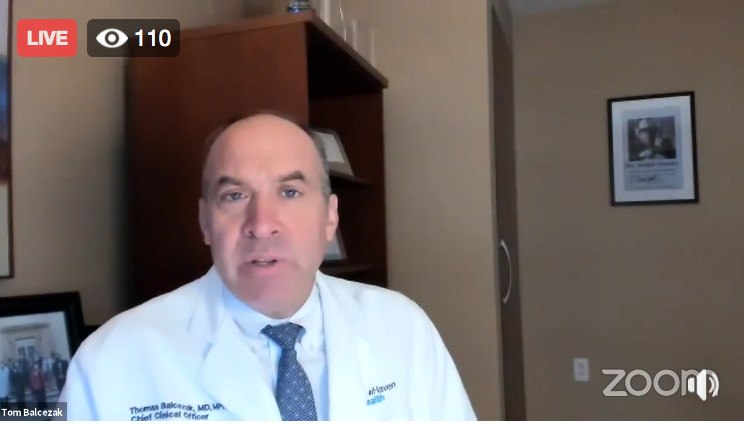On Monday morning the Yale New Haven Health System held a press tele-conference with updates on Covid-19.
Marna Borgstrom, president/CEO, and Dr. Tom Balcezak, chief medical officer, fielded questions on the spike in cases in Danbury, vaccine trials, testing, long term effects of Covid on survivors, and school reopenings.
Borgstrom started off by saying, “We’re going to be living with this for a long time. It is the new normal.”
She shared freshly updated numbers for the system.
“We’re down by a couple cases in New Haven but there was one new case at Greenwich Hospital. The numbers are so small so that the percentages look larger. There were no mortalities yesterday. Patients were discharged to go home or to rehab depending on what they needed.”
Balcezak said the hard work of social distancing, masking and hand hygiene had been necessary for a long time. “It’s exhausting, but it is keeping us safe.”
He said that 100 individuals had been pre-screened for the Pfizer vaccine trial, and that anyone interested in signing up for one of the trials should go to the Yalecovidvaccine.org website for more information. He said the vaccine, which needs to be kept quite cold at minus 80° centigrade, should be arriving from Germany shortly.
Balcezak said the FDA had granted emergency use authorization for a saliva test developed at the Yale School of Public Health and Yale School of Medicine.
“It’s an exciting step forward,” he said. “It gives one additional way to do testing and provides a novel way of collecting other than nasal swabs.”

Balcezak talked about Danbury’s recent flare up.
On Aug 21 Governor Lamont issued a COVID-19 Alert 21 for Danbury, saying the area had seen a significant increase in cases in the previous two weeks, with much of the outbreak related to domestic and international travel.
Balcezak, who said Danbury is handling the situation “aggressively and appropriately,” said it was natural to wonder if there will be flare-ups in other parts of the state, especially given the opening of schools, universities and colleges. He noted that University of North Caroline and Notre Dame had opened, only to reverse course.
Between August 2 and 20, Danbury recorded at least 178 new COVID-19 cases, according to the Dept of Public Health.
“When you see a spike in cases, we’ll need to respond quickly and need to go back to some of the restrictions we had in place back in the early part of March,” he said. “We have to continue to watch our numbers closely.”
“The American Academy of Pediatrics had come out to say, ‘Kids need school,'” he continued. “There is an important socialization aspect to education and schooling. Kids depend on schools for healthy food, and their education is important.”
Balcezak said those needs must to be balanced against the risk of the virus.
“While children usually have a milder form of the disease, and we’ve only seen a small incidence of children with Covid-19 or the multi-inflammatory syndrome, there is still a risk to children of this disease, and they can spread it to the elderly and the frail,” he said.
As for colleges, he said they are doing a good job in encouraging quarantining of college age students who arriving back at schools.
“Many are doing testing with some frequency and trying to isolate the asymptomatic. They are shortening the semester into two semesters where they can go online for some things, and discouraging large parties and gatherings,” Balcezak said. “All those steps are important. Whether we see a spike in cases is largely up to the students themselves and how they behave and conduct themselves.”
And still he noted some schools have opened, only to switch to online classes, quarantined students, or sent them home.
Canceling sports was difficult, and canceling classes and going online if there is a surge or spike will be important.
Asked about reducing the impact of Covid-19 in nursing homes, Balcezak noted there had been a recent outbreak.
The state is investigating the Three Rivers Nursing Home in Norwich, a 114-bed for-profit skilled nursing and long-term care home, where one resident died and several have been hospitalized.
The Yale New Haven Health System runs a nursing home, The Grimes Center, where he said here had been a total of 57 cases and 3 deaths since the onset of the pandemic. He said there have been no cases or deaths since at least the last 2-1/2 months at Grimes.
“We’ve been coordinating across the state of Connecticut – both in testing of nursing home residents and staff – but also creating standardized guidelines for use of personal protective equipment, and policy and practice about how to cohort patients,” he said.

As for patients who end up with long term symptoms after surviving Covid-19, Balcezak said the vast majority of patients with Covid-19 have no long term sequelae, which is a condition that is the consequence of a previous disease or injury.
Balcezak said any patient who has a long term respiratory illness and is on a ventilator for a long time can have lingering respiratory effects, and will need ongoing pulmonary rehabilitation. “But they also can have psychological effects,” he said. “It can lead to depression and almost be like a post traumatic syndrome.”
He said those patients need ongoing care.
But Balcezak said patients who have mild symptoms often experience long periods of fatigue after all other symptoms have abated.
“We don’t see any commonality in terms of what’s causing that fatigue. Those patients seem to have a combination of sometimes, anemia, some small cardiovascular impact and some impact to their lungs because of the virus,” he said. “Whether it persists beyond a couple of months is unknown, but our pulmonary physicians in our Winchester Chest Clinic have set up a follow up a Covid-19 follow up clinic.”
See also:
Covid-19 update: “Schools present the same challenges that any large gatherings do.”
Aug 12, 2020